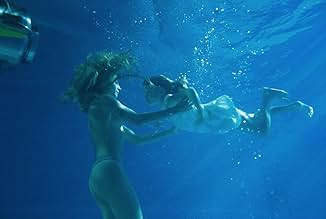विभिन्न जीवन एक पृथक द्वीप पर मिलते हैं, वे सभी एक लेखक द्वारा जुड़े होते हैं, जिसका उपन्यास उसके स्वयं के जीवन के साथ अटूट रूप से जुड़ा हुआ है.विभिन्न जीवन एक पृथक द्वीप पर मिलते हैं, वे सभी एक लेखक द्वारा जुड़े होते हैं, जिसका उपन्यास उसके स्वयं के जीवन के साथ अटूट रूप से जुड़ा हुआ है.विभिन्न जीवन एक पृथक द्वीप पर मिलते हैं, वे सभी एक लेखक द्वारा जुड़े होते हैं, जिसका उपन्यास उसके स्वयं के जीवन के साथ अटूट रूप से जुड़ा हुआ है.
- पुरस्कार
- 11 जीत और कुल 18 नामांकन
María Álvarez
- Enfermera
- (as María Alvarez)
Javier Coromina
- Camarero Chiringuito
- (as Javier Corominas)
Alesandra Álvarez
- Luna 1 año
- (as Alesandra Alvarez)
José Ferreira
- Emplastro
- (बिना क्रेडिट के)
फ़ीचर्ड समीक्षाएं
Written reality. I had the unexpected pleasure of seeing this soon after Ruiz's Proust. Both about writers creating a life.
Time folding. Narrative layers.
The three sisters from 'Alice in Wonderland,' here named Alsi/Elana, Lucia (the Alice, an anagram, in fact one that Carroll used) and Belin. The story is to Alice, for Alice, about Alice and generates the world that Alice lives in. The lighthouse and hole.
Its less than intelligent in the level of the story: lust drives meaning, but that's because the written novel is at that vulgar level. This film starts slow and ordinary, just as the novel within. But we soon weave all sorts of ambiguous narrative threads, each creating the other. The last half of the film is a bedtime story, a novel, a suicide note, a coma-induced dream, a recipe, an internet communication, a climax-induced hallucination, a blindfolded taste.
A man loves three women. Another man mirrors him. Lots of coupling, ethereal angst,
Two of the sisters plus the author (and his double), all possibly dead (all possibly fictional), on the island of conception. And the story starts again halfway.
Some lightly nuanced direction here. Endearment without cloying. The only thing in this film that is not sensually romantic is that the computer is a PeeCee and not a Mac. You'd think they'd know.
Ted's Evaluation -- 3 of 4: Worth watching.
Time folding. Narrative layers.
The three sisters from 'Alice in Wonderland,' here named Alsi/Elana, Lucia (the Alice, an anagram, in fact one that Carroll used) and Belin. The story is to Alice, for Alice, about Alice and generates the world that Alice lives in. The lighthouse and hole.
Its less than intelligent in the level of the story: lust drives meaning, but that's because the written novel is at that vulgar level. This film starts slow and ordinary, just as the novel within. But we soon weave all sorts of ambiguous narrative threads, each creating the other. The last half of the film is a bedtime story, a novel, a suicide note, a coma-induced dream, a recipe, an internet communication, a climax-induced hallucination, a blindfolded taste.
A man loves three women. Another man mirrors him. Lots of coupling, ethereal angst,
Two of the sisters plus the author (and his double), all possibly dead (all possibly fictional), on the island of conception. And the story starts again halfway.
Some lightly nuanced direction here. Endearment without cloying. The only thing in this film that is not sensually romantic is that the computer is a PeeCee and not a Mac. You'd think they'd know.
Ted's Evaluation -- 3 of 4: Worth watching.
This movie in my view is not understandable without any notion of the 'soul', whose movements are made visible by magnificent underwater shots. The sexual scenery functions not only as entrance to the story; I think Medem really wanted to depict something like 'the ultimate sex' both as experience and as ultimate, divine ideal, something like Goethes 'eternal feminine.' As something to strive for, it can deeply affect our lives by giving it the splendour we need to keep it worthwhile, even if we fail. At the same time, it is also a power deep down, a dark shadow that haunts us. It's for us to see, to accept, and to decide: do we want to go to our island and unite the two, as Lucia does? In that case, we might see that in the end our stories come true as well, be it by breaking in in the middle.
The question I asked myself after watching the movie for the third time was: where exactly is this 'middle' of it? It seems to me that it's around the scene where Elena is walking through Madrid with Luna in her baby carriage, while passing the apartment of Lucia and Lorenzo. From then on, the decisions made by the novelist - like the shivery death of his child - are such that there is no way back. Lorenzo, Lucia and their relationship are too heavily shaken up. Both have to get into a new reality which can transform their personalities; to both, this means a form of dying and leaving their old personalities behind. They surely resist this, especially Lorenzo; but also he has to put himself at risk, following the demands of his 'blood', that is, of his sex, death and rebirth. And there the story takes over the initiative from the writer, who himself is thrown into it - in the middle, where he leaves his home and runs into his 'accident'. Exactly that scene is not shown - it's the hole in the middle, through which the old reality passes into the new.
For me, this movie is a small masterpiece, which shows how film and literature can work together, and how more powerful ideas about ourselves are then the circumstances we are put into. The 'form' of the persons is therefore changeable: like Lorenzo during the last Island episode has 'changed' into Carlos. As the 'transformed' Lorenzo turns up on the island, with his distress and his love for both Elena and Lucia, 'Carlos' is no longer necessary and the women can leave him behind. The fact that Elena is eventually able to weep, marks the acceptance of her loss, which 'naturally' returns her child to her from the middle of the picture again.
The question I asked myself after watching the movie for the third time was: where exactly is this 'middle' of it? It seems to me that it's around the scene where Elena is walking through Madrid with Luna in her baby carriage, while passing the apartment of Lucia and Lorenzo. From then on, the decisions made by the novelist - like the shivery death of his child - are such that there is no way back. Lorenzo, Lucia and their relationship are too heavily shaken up. Both have to get into a new reality which can transform their personalities; to both, this means a form of dying and leaving their old personalities behind. They surely resist this, especially Lorenzo; but also he has to put himself at risk, following the demands of his 'blood', that is, of his sex, death and rebirth. And there the story takes over the initiative from the writer, who himself is thrown into it - in the middle, where he leaves his home and runs into his 'accident'. Exactly that scene is not shown - it's the hole in the middle, through which the old reality passes into the new.
For me, this movie is a small masterpiece, which shows how film and literature can work together, and how more powerful ideas about ourselves are then the circumstances we are put into. The 'form' of the persons is therefore changeable: like Lorenzo during the last Island episode has 'changed' into Carlos. As the 'transformed' Lorenzo turns up on the island, with his distress and his love for both Elena and Lucia, 'Carlos' is no longer necessary and the women can leave him behind. The fact that Elena is eventually able to weep, marks the acceptance of her loss, which 'naturally' returns her child to her from the middle of the picture again.
Stories told in a so-called "magical realism" style like this film can be very tricky. The story and the characters need to be very strong to sustain all the twists of the plot and I don't think this was pulled off here. I was disappointed, as I'd enjoyed Medem's previous film Los Amantes del Circulo Polar, where the passionate love story seemed a lot more genuine and the tragic ending seemed to fit better with the theme of fate playing with people's lives than Lucia y el sexo's tragic-to-happy contortions.
Also, while the female characters were all charming and sexy, the male roles were really poor and unconvincing. What on earth did Lucia see in Lorenzo? There isn't enough to justify her endurance and patience with him. Their whole love story seems artificial from the inception, it seems there was too much work on the symbolism of their relationship - the tormented writer and storyteller, the reader and savior (Lucia as a ray of sunshine) - rather than on the real intensity of feeling between two people. The sex scenes are too stylish and sleek to be really passionate. Everyone is good looking and well dressed, they live in nice apartments, exist in a bubble where the society around them doesn't seem to affect them, this is obviously purposefully so and ideally you wouldn't mind that lack of realism if the story was engrossing enough, which it isn't.
The entire plot seems to revolve around the concept of the ability to deal with tragic fateful events by rewriting, literally and metaphorically, one's own life story. But the final optimism comes across as too artificial. The plot does not resolve the fate of the child Luna, Lorenzo's daughter. The tragedies seem more like a prop, a trick to demonstrate how love can conquer guilt, remorse and failure. They're not given enough weight. People slash their wrists or throw themselves under buses easier than they cry, then we're supposed to believe they can just forget and forgive and live happily ever after.
The director says he wanted to make everything "light" in this film, after the experience with the previous one. But I think he overdid it! There is a bit too much of the French 'Amelie' in Lucia's character, she is more like a beautiful fairy than a real person. Elena, too, is more a symbol of caring and nurturing (motherhood, cooking, taking care of Lucia) than a real grieving mother. Her lack of anger and bitterness is not very believable. The whole escapist symbol of the floating island becomes annoying after a while. It functions on the characters like a drug inducing apathy and oblivion, more of a way of avoiding pain than confronting it. But it's not that, it's the way in which it's presented and wrapped up at the end that really disappoints - too fancy and too abstract to really work.
It's not a bad film. It's full of eye candy - the spectacularly gorgeous Paz Vegas, the island, the photography - and it is well directed and well acted overall. But without all that, the story itself wouldn't really be worth much.
Also, while the female characters were all charming and sexy, the male roles were really poor and unconvincing. What on earth did Lucia see in Lorenzo? There isn't enough to justify her endurance and patience with him. Their whole love story seems artificial from the inception, it seems there was too much work on the symbolism of their relationship - the tormented writer and storyteller, the reader and savior (Lucia as a ray of sunshine) - rather than on the real intensity of feeling between two people. The sex scenes are too stylish and sleek to be really passionate. Everyone is good looking and well dressed, they live in nice apartments, exist in a bubble where the society around them doesn't seem to affect them, this is obviously purposefully so and ideally you wouldn't mind that lack of realism if the story was engrossing enough, which it isn't.
The entire plot seems to revolve around the concept of the ability to deal with tragic fateful events by rewriting, literally and metaphorically, one's own life story. But the final optimism comes across as too artificial. The plot does not resolve the fate of the child Luna, Lorenzo's daughter. The tragedies seem more like a prop, a trick to demonstrate how love can conquer guilt, remorse and failure. They're not given enough weight. People slash their wrists or throw themselves under buses easier than they cry, then we're supposed to believe they can just forget and forgive and live happily ever after.
The director says he wanted to make everything "light" in this film, after the experience with the previous one. But I think he overdid it! There is a bit too much of the French 'Amelie' in Lucia's character, she is more like a beautiful fairy than a real person. Elena, too, is more a symbol of caring and nurturing (motherhood, cooking, taking care of Lucia) than a real grieving mother. Her lack of anger and bitterness is not very believable. The whole escapist symbol of the floating island becomes annoying after a while. It functions on the characters like a drug inducing apathy and oblivion, more of a way of avoiding pain than confronting it. But it's not that, it's the way in which it's presented and wrapped up at the end that really disappoints - too fancy and too abstract to really work.
It's not a bad film. It's full of eye candy - the spectacularly gorgeous Paz Vegas, the island, the photography - and it is well directed and well acted overall. But without all that, the story itself wouldn't really be worth much.
(8/10) Refreshing, delightful, sexy. moving and thought-provoking movie from Spain. Not really porn (as the title might suggest) although there is some very artistic explicitness. It is movies like this one that remind us that European cinema can scale the emotional dilemmas and mountains of a story where other films look at a storyline in terms of physical developments. Lucia, a young waitress in Madrid, falls completely in love with a writer. After a period of blissful togetherness, something from his past pulls him in two directions. We are caught up in his moral dilemma, of not wanting to lose the wonderful gift he has found and yet not wanting to be untrue to himself. The semi-autobiographical novel he is writing pulls together the story and the emotions and hopes of the characters and introduces ideas that enable them to heal some of their hurt. A central idea is that of finding a hole (symbolically on the sandy beach) where, after reaching the end of the story, you can jump back into the middle. That way you can try an make things turn out better ("If you give me time", says Lorenzo, Lucia's boyfriend.) A more mature and rounded work than the Director's earlier "Lovers of the Arctic Circle", Sex and Lucia combines wonderful acting, a great story, innovative cinema and spine-tingly beautiful photography. One of my favourite films of the year.
This is one of the better structured movies ever put to screen. It's as complex as Lynch's Lost Highway, but that only adds to the experience. A non-linear structure (in time and space) is applied and Lucia y el Sexo blurs the line between reality and imagination.
Basically, it's like Mulholland Drive: Most of what we see is a dream, imagination. Only a relatively small part did really happen. But this goes one step further: What part is in the eye of the beholder here, because little clues are given so the mystery format is only used to keep us entertained at a basic level.
A writer is the center here. Some parts of his life are probably true (trouble at home, sickness), others are ambiguous, others are certainly imagined. He is in the meta-story, but also places himself in threads in the other stories that come from his imagination. His imagination is formed by applying smaller and larger events (meeting a person at a party, seeing someone in front of the house) in his personal life to his fantasies. His erotic fantasies explain the title, as sex is one of the characters of the story. One of the story lines is again about his script read on the island by one of his imagined characters. Writing the story and telling the story is done simultaneously. As he becomes sick, the characters become helpless in the story. Overall it helps a lot if you keep imagining that you're watching imagined characters being manipulated by the writer. This combines meta-story and story, real with imagination, weaving several threads in a complicated web of story lines. In the end, it is made clear that the story doesn't end but starts again halfway, giving further evidence that viewers can use their imagination at random on this and create their own story out of it.
The meta-story is interesting, but by mixing it with the story itself we see the real story as what it is, a writing trick with imagined characters. That unfortunately diminishes the emotions a movie tries to convey. We're merely watching how a movie is structured, with the imagined story not having the usual dramatic impact.
It's remarkable that so many people are offended by the sex scenes, as it's already in the title. Do they also complain about the presence of aliens in Alien? I found the sex scenes to be made with some honesty; and at least they didn't even shy away of male nudity.
Basically, it's like Mulholland Drive: Most of what we see is a dream, imagination. Only a relatively small part did really happen. But this goes one step further: What part is in the eye of the beholder here, because little clues are given so the mystery format is only used to keep us entertained at a basic level.
A writer is the center here. Some parts of his life are probably true (trouble at home, sickness), others are ambiguous, others are certainly imagined. He is in the meta-story, but also places himself in threads in the other stories that come from his imagination. His imagination is formed by applying smaller and larger events (meeting a person at a party, seeing someone in front of the house) in his personal life to his fantasies. His erotic fantasies explain the title, as sex is one of the characters of the story. One of the story lines is again about his script read on the island by one of his imagined characters. Writing the story and telling the story is done simultaneously. As he becomes sick, the characters become helpless in the story. Overall it helps a lot if you keep imagining that you're watching imagined characters being manipulated by the writer. This combines meta-story and story, real with imagination, weaving several threads in a complicated web of story lines. In the end, it is made clear that the story doesn't end but starts again halfway, giving further evidence that viewers can use their imagination at random on this and create their own story out of it.
The meta-story is interesting, but by mixing it with the story itself we see the real story as what it is, a writing trick with imagined characters. That unfortunately diminishes the emotions a movie tries to convey. We're merely watching how a movie is structured, with the imagined story not having the usual dramatic impact.
It's remarkable that so many people are offended by the sex scenes, as it's already in the title. Do they also complain about the presence of aliens in Alien? I found the sex scenes to be made with some honesty; and at least they didn't even shy away of male nudity.
क्या आपको पता है
- ट्रिवियाThey say "the island" many times but they don't say its name. It is in fact, the tiny island of Formentera.
- गूफ़A full moon between two buildings is shown during midday when Lorenzo meets his daughter Luna for the first time - which is astronomically impossible.
- क्रेज़ी क्रेडिटCredits scroll in the opposite direction.
- इसके अलावा अन्य वर्जनThe US cut removes most of the frontal nudity and runs approximately 2 minutes shorter.
- कनेक्शनFeatured in Brows Held High: Room in Rome (2013)
- साउंडट्रैकUn Rayo de Sol
Written by Daniel Vangarde (as Vangarde), Claude Carrère and Amado Jaén (as Jaen)
(c) Bleu Blanc Rouge Editions Soc - Editions Productions Zagora
Ediciones Musicales Clipper's, S.L.
टॉप पसंद
रेटिंग देने के लिए साइन-इन करें और वैयक्तिकृत सुझावों के लिए वॉचलिस्ट करें
विवरण
बॉक्स ऑफ़िस
- US और कनाडा में सकल
- $15,94,779
- US और कनाडा में पहले सप्ताह में कुल कमाई
- $47,591
- 14 जुल॰ 2002
- दुनिया भर में सकल
- $76,40,680
- चलने की अवधि
- 2 घं 8 मि(128 min)
- रंग
- ध्वनि मिश्रण
- पक्ष अनुपात
- 2.35 : 1
इस पेज में योगदान दें
किसी बदलाव का सुझाव दें या अनुपलब्ध कॉन्टेंट जोड़ें




























